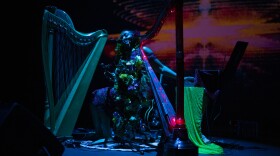When Rhiannon Giddens steps onstage Tuesday for her first performance at the recently revamped Longhorn Ballroom, the music promises to be extraordinary — and unusually timely.
Giddens is one of many Black artists who have spent years trying to correct misconceptions about the history of country and folk music, specifically, the prevailing assumption that the history of those genres is almost completely white.
Ahead of her show at one of Dallas’ most historic country venues, efforts to set the record straight on race have finally gone mainstream. And for that, there’s one massively famous Texan to thank.
“When Beyoncé came along and shone the light on this history the way only somebody with her status can do, it was ready to blow up because of the enormous and very, very hard-working group of people who’ve been keeping these questions alive,” says Giddens. “Now there’s a light on all that work, with a lot of those same people finally getting to do interviews in the wake of "Cowboy Carter" and talking about it in super beautiful ways.”

She starts listing names of advocates for inclusion and racial progress within country’s often homogenous bounds — Rissi Palmer, artist and host of Apple Music’s "Color Me Country"; songwriter and author Alice Randall; Holly G, journalist and founder of the Black Opry. But Giddens’ modesty obscures her own mammoth, zeitgeist-shifting contributions to the genre over the past two decades. It is Giddens’ banjo and viola that make up the irrepressible groove on "Cowboy Carter’s" lead single and now Hot 100 No. 1 “Texas Hold ‘Em.” That’s just three minutes and 53 seconds, though, of the multi-instrumentalist, vocalist and songwriter’s prolific and wide-ranging work.
Giddens, a two-time Grammy winner and MacArthur Genius Grant recipient, can be heard everywhere from the soundtrack to "Red Dead Redemption 2," one of the most popular video games of all time, to the opera house: "Omar," an opera she co-composed with Michael Abels, won the 2023 Pulitzer Prize in Music. Her most recent album as a soloist, last year’s You’re The One, was her first of all original songs; it was nominated for two Grammy awards. She’s worked with everyone from T. Bone Burnett to Allen Toussaint to Renée Fleming, spanning genre with clarity and a deep sense of musical history that goes back far beyond even the earliest recorded and commercial music.
The North Carolina native’s road to the spotlight started as the co-founder of the Carolina Chocolate Drops, an ensemble that made waves for the way it interpreted and reframed early Black American musical traditions including, notably, the often-overlooked tradition of Black string bands. The success of that band, which eventually opened for acts like Taj Mahal and Bob Dylan, helped open the door for a number of Black folk, country and Americana artists.
It also anticipated the work of people like local scholar, artist and activist Brandi Waller-Pace, who founded Decolonizing the Music Room as well as the Fort Worth African-American Roots Music Festival. Giddens is on the board of Decolonizing the Music Room, and has been a big supporter of Waller-Pace’s efforts. “There is a burgeoning renaissance within the Black Americana, roots, old time, country — wherever you want to call them — musics,” Giddens says. “But we need spaces within the Black community to be together and draw from each other, to then go back to the mostly white spaces that we all exist in. It’s a very important piece of cultural work that she’s doing, and it needs to be supported in a way that’s commensurate with that importance.”
In her own work, Giddens is once again pushing outward. She is in the process of writing a book, "When the World’s on Fire: How a Powerless Underclass Made the Powerful Music That Made America." “Where I’m at is looking at the fullness of the working-class, cross-cultural collaboration that really is the foundation of this music,” she says.
“Black people didn’t invent country music, nor did white people invent country music,” Giddens continues. “It was born out of an incredibly complex, multi-layered collaboration that went on over two centuries. How do we pull solidarity from our shared histories, so that we realize the same patterns are happening today to make us turn against each other so the same rich people can stay rich?”
That’s just a sampling of the deep thinking and rich history that will be channeled into Giddens’ set next Tuesday. “We’ve got a good story we’re telling with these tunes right now, and that’s what we like,” says Giddens. “The story, and the energy.”
Arts Access is an arts journalism collaboration powered by The Dallas Morning News and �Ļ�ӰԺ.
This community-funded journalism initiative is funded by the Better Together Fund, Carol & Don Glendenning, City of Dallas OAC, The University of Texas at Dallas, Communities Foundation of Texas, The Dallas Foundation, Eugene McDermott Foundation, James & Gayle Halperin Foundation, Jennifer & Peter Altabef and The Meadows Foundation. The News and �Ļ�ӰԺ retain full editorial control of Arts Access’ journalism.






